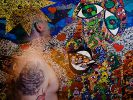Eye For Film >> Movies >> Calvet (2011) Film Review
This film is a feature-length confessional of a modern day renaissance man - a biopic of a virtually unknown French artist, currently living in Nicuaraga. Jean Marc Calvet's life is a gripping story. Our first view of his work is a sublime experience. A human face, constructed of a thousand individual pieces of shape, colour, form and tone. It's screaming. Astonishing work, in all its craven, colourful, tortured simplicity. Our first glimpse of Calvet, in an over cranked close up of him in a sea of anonymous faces is remarkable; a hard stare, even behind shades.
Jean Marc Calvet is a remarkable storyteller. He's animated, rattling off colloquial French at machine gun speed, yet contemplative and emotional when dealing with moments of sheer regret. The film does not shy away from this. We never once see him fail to deal with his emotions. Calvet's guilt over abandoning his son Kevin becomes the impetus for his artistic expression and later penance for reconciliation and redemption.

After his time in elite military service, he gets a job as a bodyguard, having been noticed at a shooting competition. For reasons unsaid - but later dealt with in depth - he goes to the United States to become a bodyguard for a massive wage hike, and abandons his family in the South of France. After working several months unpaid, he rips off his boss for $50,000 in cash (and an additional $600,000 in cashier's cheques).
Suicidal, Calvet locks himself into a den and immediately starts a crack, alcohol and heroin binge that lasts three months, eventually exploding Pollock-style in a vomitorium of art. This is shown using three lengthy pieces of footage, where Jean Marc tells the story in his Nicuaraga home, a deeply personal revisitiation of the den, where he physically demonstrates the "vomit" and art meltdown, and a small piece of clever tone poem reconstruction. It's an awesome scene, charged with emotion and edited to perfection by Paul Carlin.
The film is well-told. It's deliberately structured, slipping back and forwards in time to illustrate the strongest crisis points in Calvet's life. It mixes days of conversation with director Dominic Allan, with a detailed across-the-world tour of the most influential places in Calvet's life. Our initial headlong rush into hedonism directly compares with his later fall and emergence as a mature, contemplative artist. His work is a struggle to reconnect with his deep humanity. Watching him take his demons head on is riveting.
We deal with his life's work - his compulsion on painting. "It's stronger than me", "painting is my fucking life raft" As a work takes shape, he astutely describes his emotional state, being compelled to complete the painting. And even while away from a canvas, we see him scribble away furiously on a sketchpad using cheap highlighters and pencils.
We see him wrestling with the letter for his abandoned son, now a young man. Even while a turmoil of emotions, he distinctly avoids empty platitudes and cheap greasy emotional witter - he's much too self-aware for that.
He lives with his new wife in Nicuaraga, with a deaf and mute daughter. He's not worried, being an obviously doting, loving father - "I was blind, deaf and mute for years".
Calvet is an extraordinary achievement - certainly one of the best films of the year. In trusting director Dominic Allan, Jean Marc Calvet found a symbiote to make yet another piece of magnificent art. Allan tells the artist's story with enormous care, attention, skill and passion. It is emotionally touching, raw, painful and honest. Catharsism and redemption. It is sheer drama.
Reviewed on: 20 Jun 2011
















